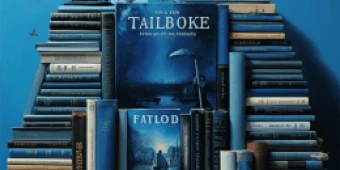10 Our All-Time Favorite Book-to-Movie Adaptations

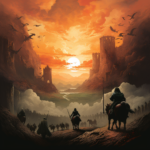
The Lord of the Rings Trilogy (2001-2003)
by Peter Jackson
DescriptionThe “Lord of the Rings” trilogy, directed by Peter Jackson and based on J.R.R. Tolkien’s novels, is an epic fantasy adventure that chronicles the quest to destroy the One Ring. These films are renowned for their groundbreaking visual effects, deep storytelling, and richly developed characters. Writing an essay on this trilogy provides an opportunity to explore themes such as the struggle between good and evil, the power of friendship and sacrifice, and the impact of power and corruption. Additionally, it’s a chance to analyze the adaptation of complex literature into film, and the cultural and cinematic significance of this landmark series.
- "The Lord of The Rings" Essays: Film and Literary Analysis
- The Fellowship of The Ring: One of The Best Screen Versions of 21 Century
- The Impact of "The Lord of The Rings" on Popular Culture
- The Lessons Behind J.R.R. Tolkien’s "The Lord of The Rings" and Disney’s "The Lion King"
- The Lord of The Rings Trilogy as an Epic
- Temptation in "The Lord of The Rings"
"The Lord of The Rings" Essays: Film and Literary Analysis
The Lord of the Rings Essay Samples: Character Analysis
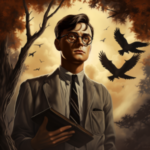
To Kill a Mockingbird (1962)
by Robert Mulligan
Description“To Kill a Mockingbird”, directed by Robert Mulligan, is a film adaptation of Harper Lee’s novel. This classic American film is revered for its powerful exploration of racial injustice and morality in the Deep South during the 1930s. The story, told through the eyes of young Scout Finch, centers on her father, Atticus Finch, an attorney who courageously defends a black man unjustly accused of raping a white woman. Writing an essay on this film provides a chance to analyze themes of racism, integrity, and the loss of innocence, as well as its portrayal of moral and ethical dilemmas in a segregated society.
- Analysis of Atticus Finch as a Static Character in "To Kill a Mockingbird"
- The Trials of Black Men: Tom Robinson and Oj Simpson
- The Courage of Atticus Finch in "To Kill a Mockingbird"
- Atticus Finch as a Role Model in "To Kill a Mockingbird"
- Tom Robinson’s Exhibitions of Courage in "To Kill a Mockingbird"
- Characteristics of Boo Radley in "To Kill a Mockingbird"
- Overview of The Role of Boo Radley in "To Kill a Mockingbird"
- To Kill a Mockingbird by Harper Lee: Summary
- An Evaluation of "To Kill a Mockingbird" as a Timeless Classic
- To Kill a Mockingbird: Literature Review
- The Main Idea of The Novel "To Kill a Mockingbird"
"To Kill a Mockingbird" - Characters Analysis in Essays
"To Kill a Mockingbird" Review - Essay Samples
"To Kill a Mockingbird" - Questions & Answers
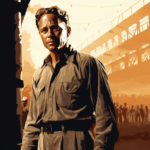
The Shawshank Redemption (1994)
by Frank Darabont
Description“The Shawshank Redemption”, directed by Frank Darabont, is a profound narrative of hope and perseverance within the confines of a prison. Centered around Andy Dufresne, wrongfully convicted of murder, and his friendship with Red, the film masterfully explores themes of freedom, institutionalization, and redemption. Writing an essay on this film allows for an in-depth analysis of its character development, the representation of prison life, and the enduring human spirit. Its layered storytelling, rich symbolism, and the emotional impact it leaves on its audience make it an exemplary topic for exploring the power of narrative cinema.
- The Power of an Individual’s Will and Hope in "Shawshank Redemption"
- The Transformative Power of Hope in "Shawshank Redemption"
- Hope as a Driving Force in the Movie "The Shawshank Redemption"
- A Sense of Hope in "Shawshank Redemption"
- Critical Analysis of The Film "The Shawshank Redemption"
- Quote Analysis from "Shawshank Redemption"
- Moral Principles in The Movie "Shawshank Redemption"
- The Theme of Racial Inequality in "Shawshank Redemption" and "Crash"
- Oppression in "Shawshank Redemption" and "Cool Hand Luke"
- Evaluating the Theme of Abuse and Power in "Shawshank Redemption"
Theme of Hope in "Shawshank Redemption" Essays
Other "Shawshank Redemption" Essay Themes
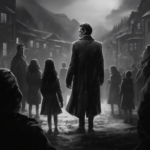
Schindler's List (1993)
by Steven Spielberg
Description“Schindler’s List” is a harrowing and deeply moving film about the Holocaust. It recounts the true story of Oskar Schindler, a German businessman who saved over a thousand Jewish lives by employing them in his factories. An essay on this film could delve into the complexities of Schindler’s character, the portrayal of the horrors of the Holocaust, and the film’s exploration of themes like moral ambiguity, heroism, and the resilience of the human spirit. Its historical significance, powerful storytelling, and emotional depth make it an important subject for analysis in understanding cinematic representations of history.
- Comparative Analysis of "Schindler’s List" and "Night and Fog"
- Saving Private Ryan and "Schindlers List": Films Analysis
- The Movie "Schindler’s List": Analysis
- Reflecting on the Movie "Schindler's List"
- Response to The Film "Schindler's List"
- Critical Review of The Film "Schindler's List"
Schindler’s List: Essay Samples on Analysis and Reviews
Essays on "Schindler's List": War and Holocaust
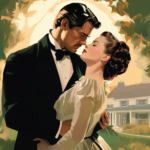
Gone with the Wind (1939)
by Victor Fleming
Description“Gone with the Wind” by Victor Fleming, is an epic film set against the backdrop of the American Civil War and Reconstruction era. It tells the story of Scarlett O’Hara, a strong-willed daughter of a plantation owner, and her tumultuous love life. An essay on this film could explore its portrayal of the Old South, its romanticization of slavery, and its impact on the depiction of American history in cinema. The film’s complex characters, particularly Scarlett’s evolution, and its enduring status as a cinematic classic make it a rich subject for analysis in film studies and cultural history.
- Analysis of Film Techniques in "Gone with The Wind"
- Summary of "Gone with The Wind" by Margaret Mitchell
- The Scarlett O'hara's Character Development
- Literary Review of "Gone with Wind"
"Gone with the Wind" - Essay Samples
"Gone with the Wind" - Q&A
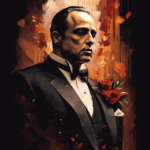
The Godfather (1972)
by Francis Ford Coppola
Description“The Godfather”, directed by Francis Ford Coppola, is a landmark film in the crime genre, portraying the complex dynamics of the Corleone mafia family. The film explores themes of power, loyalty, and the corrupting influence of organized crime on family and personal integrity. Writing an essay on “The Godfather” allows for a deep exploration of its narrative structure, character development, especially Michael Corleone’s transformation, and its influence on the portrayal of the mafia in media. Its cinematic style, thematic depth, and cultural impact make it an essential subject for analysis in film studies and American culture.
- Analysis of Cinematic Facets of "The Godfather"
- Analysis of The Utilization of Lighting in "The Godfather"
- Comparative Analysis of "The Public Enemy" and "The Godfather"
- The Differences in Style and Theme Between "The Godfather" and "Goodfellas"
- A Comparative Analysis of "Goodfellas" and "The Godfather"
- Portrayal of Mafia in "The Sopranos" and "The Godfather"
Essays on 'The Godfather' - Cinematic Techniques
The Godfather Essay Samples - Comparing Films
Character Analysis of "The Godfather" in Essays

The Great Gatsby (2013)
by Baz Luhrmann
Description“The Great Gatsby” by Baz Luhrmann is a visually stunning adaptation of F. Scott Fitzgerald’s classic novel. Set in the Roaring Twenties, it portrays the tragic story of Jay Gatsby and his obsession with Daisy Buchanan. An essay on this adaptation could explore how the film interprets and visualizes the novel’s themes of decadence, idealism, and the corruption of the American Dream. The movie’s modern music, unique visual style, and the performances of its cast provide a contemporary perspective on the classic story, making it a compelling subject for analysis in the context of book-to-movie adaptations.
- The Great Gatsby: Comparison of The Movie and The Book
- Comparative Analysis of The Book "The Great Gatsby" and Its Movie Adaptation
- The Theme of Happiness: Unveiling Truth in American Narratives
- Wealth and Morality in "The Great Gatsby": A Film Analysis
- Exploring Symbols and Allegories in Luhrmann's "The Great Gatsby"
- Loss of Meaning in Film Adaptations of "The Great Gatsby"
- How Movie is Better in Portraying The Story of "The Great Gatsby"
- Challenging the American Dream in "The Great Gatsby"
The Great Gatsby Essay Samples: Movie VS Book
The Great Gatsby in Movie: Essay Topics
The Great Gatsby Adaptation: Q&A

The Hunger Games (2012)
by Gary Ross
DescriptionAdapted from Suzanne Collins’ novel, “The Hunger Games” (2012) is a gripping film set in a dystopian world where teenagers are forced to fight to the death in a televised event. Analyzing this adaptation in an essay allows for exploration of its themes such as societal control, media influence, and rebellion against oppressive systems. The film’s translation of the novel’s narrative, its visual representation of the futuristic world, and the performance of its cast, particularly Jennifer Lawrence as Katniss, offer rich material for examining how literature is transformed into a cinematic experience and its impact on audiences.
- A Detailed Analysis of "The Hunger Games: Mockingjay Part 1"
- A Look at The Theme of Trust as Depicted in "The Hunger Games"
- A New World Order in "The Hunger Games"
- A Study of The Feminism Experience in "The Hunger Games"
- Social Issue of Government Control in "The Hunger Games"
- The Themes of Political Control and Power in "The Hunger Games"
Various "The Hunger Games" Essay Samples

The Martian (2015)
by Ridley Scott
DescriptionIn “The Martian,” Ridley Scott brings to life the thrilling story of survival and resilience on Mars, adapted from Andy Weir’s novel. The narrative focuses on astronaut Mark Watney’s resourcefulness and determination to stay alive against all odds on the Martian surface. An essay on this film could delve into the realistic portrayal of space exploration, the use of science and humor in the storyline, and the broader themes of human ingenuity and perseverance in extreme conditions. The film’s blend of scientific accuracy and gripping storytelling makes it an engaging subject for analysis in terms of both its cinematic techniques and its depiction of human endurance.
"The Martian" Essay Topics

No Country for Old Men (2007)
by Joel and Ethan Coen
DescriptionJoel and Ethan Coen’s “No Country for Old Men” is a gripping neo-Western thriller that intertwines violence, morality, and fate. Set in the desolate landscapes of West Texas, it follows the aftermath of a drug deal gone wrong and the relentless pursuit of a mysterious killer. This film offers a rich ground for analysis, from its exploration of the randomness of violence to the philosophical depths of its characters. Its stark cinematography, tense narrative, and the haunting presence of the antagonist Anton Chigurh contribute to a profound cinematic experience, making it an excellent subject for a detailed essay.

- Instructions Followed To The Letter
- Deadlines Met At Every Stage
- Unique And Plagiarism Free


